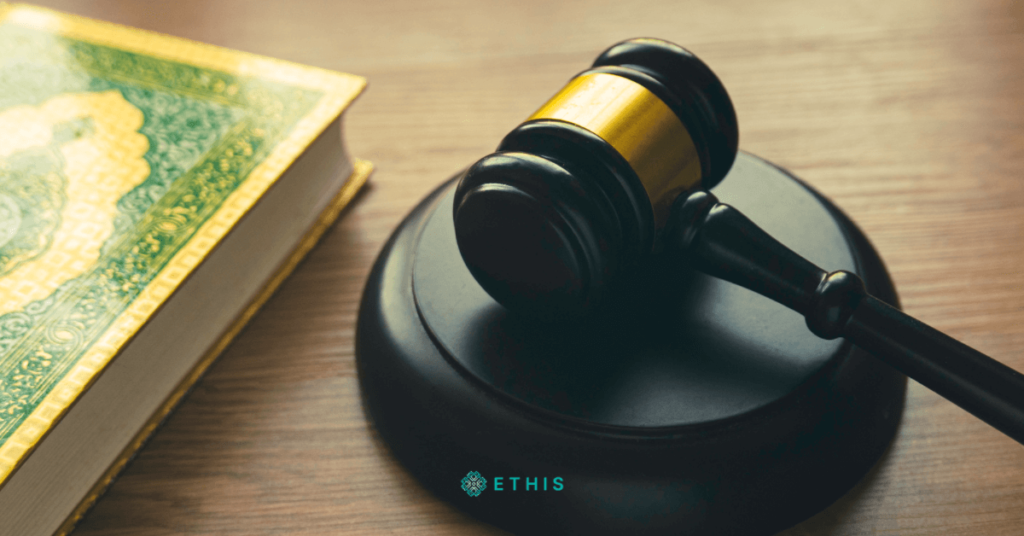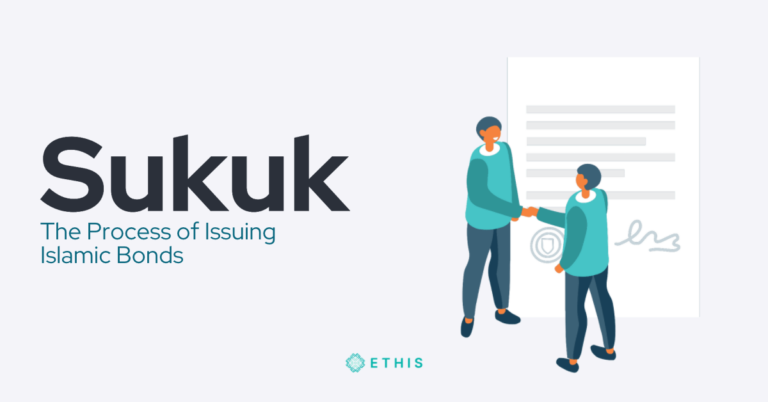
As crucial as they are, many aspects of conventional finance are not in line with Islamic beliefs. For this reason, the Islamic finance approach often delves into alternative routes for the same financial outcomes.
Without the presence of interest (riba), or through the reduction of excessive debt for instance, mechanisms must be built to circumvent certain conventional concepts while retaining the permissible features that are integral for modern economic relations.
Sukuk is a good example of this in practice, as the Islamic response to standard bonds.
Let’s take a look at the standard definition of Sukuk, its implications in Islamic Finance and the unique yet relatively simple process of how these Islamic bonds are issued.
Related – Critical Shariah Issues Related to Sukuk Guarantees
The basic idea of Sukuk


At its core, Sukuk refers to Shariah-compliant investment certificates or notes that show a proportionate stake in tangible assets, usufructs, and services, or investments in the assets of specific projects or unique investment activities.
The basic idea of Sukuk is that the holder has undivided ownership in a certain asset and is thus entitled to the asset’s return.
Sukuk is a non-interest based investment and financing vehicle that is part of Islamic finance, but its use is not limited to Muslims because it adheres to ethical values and fairness.
Sukuk bonds are interest free


In terms of the parties involved and the goal of the bond issuance (raising funds), Sukuk bonds are quite identical to conventional corporate bonds.
However, due to the fundamental principle that a Sukuk is an economic and equal joint venture between the issuers and the investors, there are certain major structural differences.
This means that the assets purchased through the Sukuk bond issuance will be collectively owned and managed in order to create income, which will be utilised to repay the sukuk holder. As a result, unlike traditional bonds, the Sukuk holder does not get interest, but rather a share of the profits created by the asset purchased with the proceeds of the Sukuk issuance.
The Accounting and Auditing Organisation for Islamic Financial Institutions (AAOIFI) develops accounting, auditing, governance, ethical, and Shari’ah compliance standards. It has specified a variety of Sukuk structures, including those issued by sovereigns, quasi-sovereigns, supranationals, and corporations, as well as “green” Sukuk certificate.
Sukuk abides by Islamic law


Sukuk dates back almost as far as Islam itself. They can be traced back to the Islamic Hijri calendar’s first century. According to a Sukuk lecture series by Marifa Academy, the Umayyad kingdom issued Sukuk to its troops and public officials as pay for their efforts by the 7th Hijri century (watch, runtime: 9:34).
As such, these Sukuk are constructed to provide returns to investors while being compliant with Islamic law.
Sukuk funds are made up of undivided shares in tangible assets related to certain projects or unique investment activities. An investor in a Sukuk owns a common share of the assets that are related to the investment.



Sukuk differs from traditional bonds in that it is based on a contractual obligation to pay bondholders interest. Instead, the income of a Sukuk holder is tied to the performance of the underlying asset, which is usually monitored over a predetermined time period.
The Sukuk holder’s investment is also exposed to the risk of the asset losing value.
Sukuk has grown in importance as an Islamic financial tool for obtaining financing for long-term projects since 2000, when Malaysia issued its first Sukuk. Bahrain was the next country to follow in 2001. Since then, Sukuk has been utilised to raise alternative finance by both corporations and governments.
In general, the Sukuk industry has been at the forefront of humanitarian Islamic funding. For example, the International Finance Facility for Immunization (IFFIm) has created a unique life-saving Islamic investment vehicle with the help of the World Bank.
What are the purposes of Sukuk and Bonds?


From the issuers’ perspectives, the main focus of these financial tools is for raising funds to support operations or expansion goals.
From the perspective of investors, they are an investment opportunity with periodic returns or payments and the possibility of a price increase.
A diversification strategy for investors, as Sukuk and Bonds, as well as other securities, are included in their portfolios.
What are some fundamental distinctions between Sukuk and Bonds?
In essence, Sukuk are Shariah-compliant financial certificates that allow investors to own a portion of an issuer’s assets until they mature. Bonds, on the other hand, are financial certificates that allow investors to lend money to the issuer in exchange for a promise to repay the money at a later date.
Bondholders receive monthly interest payments, whereas Sukuk holders receive a portion of the underlying asset’s profit.
Issuing Stocks vs. Sukuk and Bonds:
- When a firm issues stock, it is selling a portion of its ownership in return for money.
- Sukuk certificates allow investors to own a portion of an issuer’s assets until they mature. Bonds, on the other hand, allow investors to lend money to the issuer in exchange for a promise to repay the money at a later date.
- Stocks are issued solely by corporations, whilst Sukuk and Bonds are issued jointly by corporations and governments.
- Sukuk and bond prices are less volatile than stock prices, but stock returns may be bigger than Sukuk and bond returns.
- Sukuk and bonds typically provide fixed returns as well as principal payments, but stocks do not typically promise set returns and instead rely on the company’s performance.
The typical issuing process


The financial instrument’s unique nature necessitates a special issuing method. In the issuing procedure, the following steps can usually be observed:
- A corporation in need of funding (known as the “originator”) forms a special purpose vehicle (SPV). If the originator runs into financial difficulties, the SPV shields the underlying assets from creditors.
- This special purpose vehicle (SPV) creates and sells Sukuk certificates to investors.
- The originator then uses the revenues from the selling of the certificates to the investors to purchase the requisite asset.
- The asset is purchased from the originator by the SPV.
- SPV pays the revenues of the asset sale to the originator.
- The SPV arranges for the asset to be leased to the originator. The originator then sends lease payments to the SPV, which then distributes the funds as lease income to the holders.
- On the lease’s expiration date, the originator buys the asset from the SPV for its nominal value. The proceeds are distributed to the certificate holders by the SPV.
Investors that are interested in the many intricate elements of Islamic Finance must familiarise themselves with the major concepts involved in routine aspects like Sukuk. These financial components are not necessarily difficult to understand, but they take some getting used to for those of us who are coming from the standpoint of conventional finance. Hopefully this breakdown has helped to clarify some questions about Sukuk and the way it works.





Top Posts
Islamic P2P Crowdfunding Explained
How to Earn Halal Money? The Money Mindset
Halal Investments for Singapore Muslims? It’s time for a shake-up in the Islamic Investments scene.
Smart investment for making Halal money
3 Reasons Why Property Crowdfunding is the Smart Investment for You